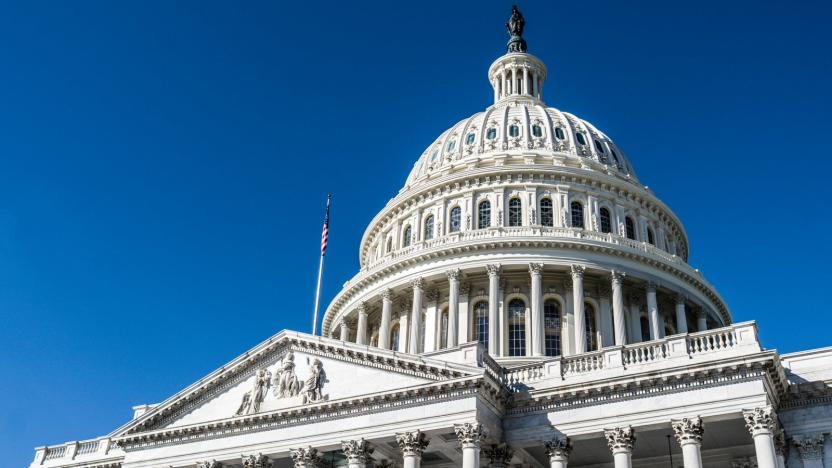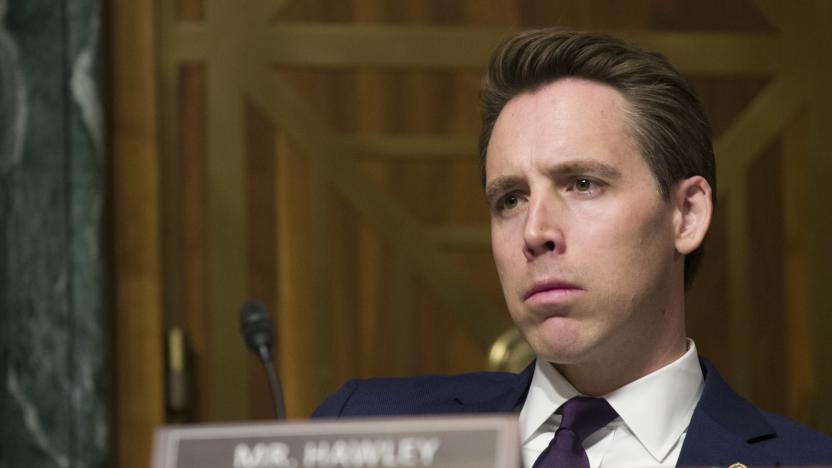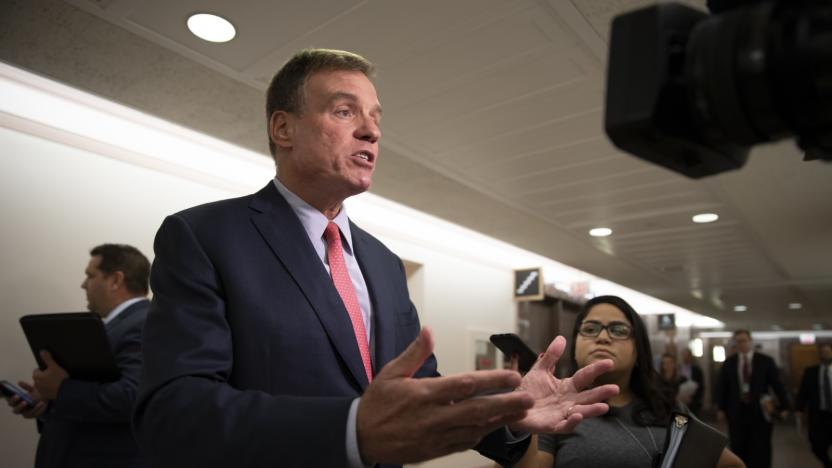legislation
Latest

51 companies tell Congress it's time to tackle data privacy
The corporate world isn't waiting around for Congress to get started on tougher data privacy laws. A group of 51 CEOs from the Business Roundtable advocacy group, including tech companies like Amazon, AT&T, IBM, Motorola and Qualcomm, have sent an open letter to House and Senate leaders asking them to pass a "comprehensive consumer data privacy law." They claim that state privacy laws vary too widely, leading to confusion for customers and potentially threatening the US' competitiveness. A federal law would reportedly bolster trust and create a "stable policy environment" where companies can craft products knowing exactly where the boundaries are.

Senator wants to ban 'addictive' social network features in new bill
Never mind relying on your phone's wellbeing tools to curb your social network addictions -- if one congressman has his way, the law itself would step in. Senator Josh Hawley has introduced a bill, the Social Media Addiction Reduction Technology Act (yes, that's SMART Act), that would ban features deemed to be exploitative. It would primarily forbid infinite scrolling, autoplaying media and achievements that don't "substantially" reward users with more content. There would have to be "natural stopping points" that encourage users to take a break, for hat matter.

Bipartisan highway bill proposes $1 billion for EV charging corridors
Today, a bipartisan group of senators are introducing the largest highway legislation in history. The America's Transportation Infrastructure Act of 2019 proposes investing $287 billion over five years in federal transportation projects. While it includes standard measures like funding for highways and bridges, at least a few billion dollars are slated for reducing carbon emissions and installing EV chargers along highway corridors.

A new bill could ban facial recognition in federally-funded housing
Now that facial recognition is more common, so are the laws aiming to limit its scope. San Francisco, Oakland, Calif. and Somerville, Mass. have all passed laws prohibiting city use of facial recognition. Now, a group of Congresswomen hope to pass the first federal legislation to limit the technology. According to CNET, the No Biometric Barriers to Housing Act is expected to be introduced this week.

New York City bill could make selling phone location data illegal
New York City could become the first city in the country to ban the sale of geolocation data to third parties. A bill introduced today would make it illegal for cellphone and mobile app companies to sell location data collected in the city. It would impose hefty fines -- up to $10,000 per day, per user for multiple violations -- and it would give users the right to sue companies that share their data without explicit permission.

Congress tries to limit Trump's ability to ease Huawei restrictions
President Trump's desire to lift some restrictions on Huawei won't go unchallenged. A bipartisan group of senators has introduced a bill, the Defending America's 5G Future Act, that would effectively set the original blacklisting in stone. It would "codify" the executive order forbidding sales of telecom equipment to customers posing national security risks, bar the removal of Huawei from the Commerce Department Entity List without an act of Congress. It would also block waivers that any administration might offer to US companies doing business with Huawei.

Lawmakers want to block tech giants from offering digital currency
It's been one month since Facebook (and its partners) announced plans to launch Libra cryptocurrency. Already, US lawmakers are calling for Facebook to pause those plans. Now, some legislators want the company to stop altogether. According to Reuters, the Democratic majority of the House Financial Services Committee drafted legislation that would prevent big tech companies from functioning as financial institutions or issuing digital currencies.

Virginia updates its revenge porn law to include deepfakes
With AI tools making it increasingly easy to create fake explicit images, the problem of revenge porn is only getting worse. Now, the state of Virginia has expanded its law against harassment through the sharing of sexual images to cover deepfake images and videos.

Senate bill would make companies put a price on personal data
Many will tell you that internet giants see your data as their most valuable resource, but politicians now want to put a number on that value. Senators Mark Warner and Josh Hawley are introducing the Designing Accounting Safeguards to Help Broaden Oversight and Regulations on Data Act (conveniently DASHBOARD Act for short), a bill that requires companies with 100 million or more monthly users to not only disclose the type of data they collect, but to put a monetary value on that data every 90 days. If Facebook and Google think you're worth $5 per month, they would have to say as much. The Securities and Exchange Commission would have to develop methods for calculating that value.

New York Senate passes ban on Elon Musk's Not-A-Flamethrower
If you live in New York state and bought one of The Boring Company's Not-A-Flamethrowers, you probably want to get rid of it shortly. The state's Senate recently passed a bill that bans the possession of a flamethrower for recreational purposes, and legislators very explicitly singled out Elon Musk's gadget as an example. The measure bars specifically bars any device that projects burning fuel at least three feet away, which appears to include Boring's hardware.

Bipartisan House bill aims to curb illegal robocalls
The US Senate has shown bipartisan support for a bill to crack down on robocalls, and now it's the House's turn. Energy and Commerce Committee Chairman Frank Pallone and Ranking Member Greg Walden have introduced a bipartisan Stopping Bad Robocalls Act that would similarly toughen requirements for carriers while more explicitly punishing spam callers. There are some key differences between the two, however.

Florida allows self-driving car tests without backup drivers
Companies that want to test their self-driving cars will have an easier time of it in the Sunshine State. Florida Governor Ron DeSantis recently signed a bill allowing companies to test autonomous vehicles without backup drivers. It also lets occupants text, watch video or otherwise enjoy themselves without running afoul of distracted driving rules. They'll need to meet insurance requirements, but that's about as far as it goes.

UK proposal would eliminate greenhouse gas emissions by 2050
The UK is setting firmer environmental targets in the wake of large-scale climate protests. Outgoing Prime Minister Theresa May has proposed legislation that would cut greenhouse gas emissions to zero by 2050 -- the "first major economy to do so," she claimed. The country already has a law requiring an 80 percent emissions cut by that point, but this is clearly more ambitious.

California advances bill offering protections to gig economy workers
Gig economy companies like Uber and Lyft have fought hard to avoid treating workers as full-fledged employees, but they might not have much choice in California before long. The state Assembly has passed a bill, AB5, that would require businesses to prove that someone is an independent contractor and thus doesn't merit employee benefits. They would have to show that a worker isn't controlled by the company, isn't performing tasks at the core of the company's business and operates their own independent business. If not, they'd have to be treated as employees and receive benefits like overtime pay, minimum wages, health care and parental leave.

Maine passes bill requiring ISPs to ask permission before selling data
The current federal government might not be keen on privacy rules for internet providers, but Maine certainly is. The state's Senate has passed a bill that requires consent before ISPs can sell or offer access to their customers' private data, paralleling an earlier approval in the state House. It just needs Governor Mills' approval to become law.

Congress could require a car alarm for kids left inside
In the past 20 years, more than 800 children have died of heatstroke in cars in the US. Now, a group of lawmakers wants to require alerts that would remind parents to check for children in the backseat before exiting the vehicle. Legislation announced today would mandate "a distinct auditory and visual alert," and it would require a feasibility study for retrofitting existing vehicles with the system.

Anti-robocall bill passes almost unanimously in the Senate
Senators have overwhelmingly backed a bill to combat robocalls. They voted 97-1 to pass the Telephone Robocall Abuse Criminal Enforcement and Deterrence Act, which would empower law enforcement to tackle robocallers, and bump up civil penalties to as much as $10,000 per call.

Senators propose legislation to protect your phone at the border
For years, US border agents have been demanding access to digital devices as people pass into and out of the country. The practice has raised red flags and lawsuits, and the number of searches has spiked under the Trump Administration. Last month, the ACLU charged federal agents with wielding "near-unfettered authority" to search phones, PCs and other devices. Yesterday, Senators Ron Wyden (D-OR) and Rand Paul (R-KY) introduced a bill that would require agents to obtain a warrant or written consent before they crack open digital devices and snag users' data.

Senators reintroduce bill to improve AI adoption in government
US senators aren't giving up on their dream of promoting AI use in government. A bipartisan group including Cory Gardner, Kamala Harris, Rob Portman and Brian Schatz has reintroduced the AI in Government Act in a bid to foster the adoption of AI in the federal government. As before, it would task government branches with exploring and implementing the use of the technology where possible.

Senate bill would ban paid loot boxes in games aimed at kids
Efforts to crack down on loot boxes in the US might be underway in earnest. Senator Josh Hawley has introduced a bill, the Protecting Children from Abusive Games Act, that would bar games from including paid loot boxes, pay-to-win mechanics and other potentially exploitative elements in games that are either aimed at kids under 18 or knowingly let those children make microtransactions. These practices spur "compulsive habits," Hawley said, and developers shouldn't be permitted to "monetize addiction."



